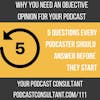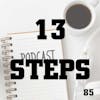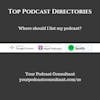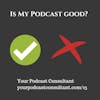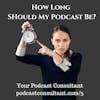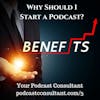When Do I Mark My Podcast As Explicit?

I get this question on a fairly regular basis. And that is, Hey, we said this, should I mark my podcast as explicit? One time I was thoroughly confused because they were mentioning the F word. And I'm not going to say any of these words today, I'm...
I get this question on a fairly regular basis. And that is, Hey, we said this, should I mark my podcast as explicit? One time I was thoroughly confused because they were mentioning the F word. And I'm not going to say any of these words today, I'm going to keep mine clean, but it was the F word. It's the one that rhymes with fire truck. And they said, Can I use this (the F Word) Because I'm using it as an adjective, not a verb. And the fun part of this, especially when it comes to Apple, is they've never really defined exactly what is explicit. So consequently, you can't go right up to the line because well, the line isn't very well designed.
Which leads everybody going well, is it okay to talk about this if it's .........? So here's my answer to that. Number one, there is no answer. It's really up to you. I'm going to talk about what the consequences are here in a second. But most of the time, if you have to ask, Is this explicit? The answer is, Yeah, probably.
Would you listen to this episode with a three year old in the car? That's another way of thinking about it.
So let me tell you what happens when you mark a single episode as explicit. Even though it's just an episode, your entire show will be banned in a bunch of countries. And I want to thank Daniel J. Lewis, he's the guy behind mypodcastreviews.com If you mark a single episode, your show will be pulled from Apple's directory in the following countries:
Bahrain
Belarus
Brunei Darussalam
Burkina Faso
Chad
Egypt
India
Jordan
Lebanon
Nepal
Oman
Qatar
Saudi Arabia
Tunisia
United Arab Emirates
Uzbekistan
Yemen
So kiss that goodbye.
Now the other thing that can happen is if you leave it labeled clean, and somebody goes to Apple and says I would like to report this episode, there is a chance they will pull your entire show.
The third option is okay, I don't want to mark it explicit because I want to be available everywhere. Then you can bleep out the naughty words.
Free 15 Minute Strategy Session
Click HERE to Apply for a Free Strategy session
I'm Dave Jackson from the School of podcasting comm thanks for joining me on my mission to rid the world of boring podcasts and I look forward to being your podcast consultant.
George Carlin's 7 Dirty Words You Can't Say on TV
Fall in Love with Podcasting. CLICK HERE to ignite your passion!
You’ve probably heard the phrase knowledge is power. I always say knowledge is power when you act on it. Today I’m going to explain when knowledge is a curse.
The curse of knowledge is when you and your guest know something. This might be because you’ve known the guest for years, or it may be that you just had a conversation before you pressed record.
I always tell people to identify their target audience when creating a podcast. When you record I want you to do one of two things. If you are recording a solo show, talk to that listener, and notice I siad listener not listeners. I know on YouTube it seems like everyone starts off with “hey guys” but I recommend talking to ONE person. IT creates a more intimate feel as the listener feels like you are talking to THEM. When you record an episode, picture them sitting across the desk from you and you’re excited to tell them about the topic for this episode.
When you do an interview, picture yourself sitting at a table with your guest across from you and your listener sitting to the left of you. This is often where the curse of knowledge comes into play. You bring up that time at the weidapit and how much fun it was with Lisa. Your audience doesn’t know what a weidapit is, and who the heck is Lisa?
The other thing I’d like to mention here is so many people think that a podcast is a conversation. To this I say you are missing two letters. It should be conversational. You don’t want an interview to be an interrogation, but you also have to remember there is a third person at the table listening to you and your guest talk. You need to know who that person is and what they are looking for. I have a friend I’ve known for decades and when I get together with him and his wife, we will eventually start talking about guitars. His wife is not a guitar player, and hence is bored out of her gourd. Never forget that someone is listening to you.
This doesn’t mean that you can’t have a conversation. Just remember that just because it’s a real conversation, it doesn’t mean it’s entertaining. I was married to a nurse and when I went to her holiday parties, all of her co-workers almost spoke in a different language. They used so much jargon. You need to remember there may be new people listening.
Featured Episodes
A good place to start
















